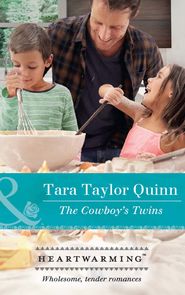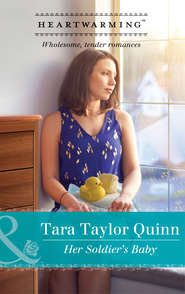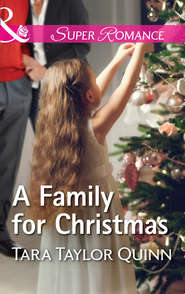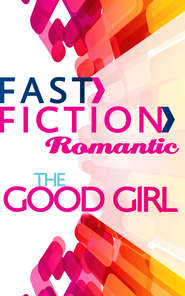По всем вопросам обращайтесь на: info@litportal.ru
(©) 2003-2024.
✖
For Joy's Sake
Автор
Год написания книги
2019
Настройки чтения
Размер шрифта
Высота строк
Поля
Right. That was how she’d seen it, too. So...everything was fine?
“Which leads me to suspect, as I mentioned a few minutes ago, that you sometimes come here for another purpose.”
Recognizing the defensiveness that suddenly flared within her, Julie slowed her thoughts. “I’m not sure I understand.”
“Personal intimacy.” Lila said the words softly, almost as though she could diminish their impact. “You’re close to your brother and Chantel, as you should be. They’re your only family, and the three of you are good together...”
Julie nodded. They had to work at it, she and Colin mostly, but they were good together. She with her own wing in the house, he and Chantel with theirs. They all met for breakfast, which Julie prepared every morning. Otherwise they might not see each other for days.
“But besides them, you have...”
A small circle, Julie finished silently when Lila’s voice dropped off. She had acquaintances. What seemed like millions of them. And, yes, those few friends.
“There are a couple of women I consider close,” she said. Her best friend from high school, for one. Jaime, an artist, lived in New York now, but they were still in touch.
“I hope you consider all of us here your friends,” Lila said, finally picking up her cup of tea and sipping. “But I’m not just talking about friends. Look at Sara and Lynn—” full-time counselor and resident nurse at the Stand “—they’re both committed to this place and have personal lives, too. They have spouses and children.”
“You don’t.” Even as she let the words loose, Julie knew they came from her defensiveness. Not the right reason at all.
“I’m fifty-three years old,” Lila said, appearing completely unflappable. “Past my childbearing years.”
“I’m not opposed to having a future,” Julie said slowly, trying her best not to be defensive. Lila wasn’t completely wrong to have concerns. Julie’d had similar conversations with Dr. Larson.
“But you haven’t been on a single date since high school.”
“That’s right.” Not that she hadn’t been asked—and fairly often, too. Until just over a year ago, she hadn’t set foot out of her house for any kind of social function. And not for a business one, either, if it was at night. Except on rare occasions when she’d gone somewhere with Colin—having vetted the guest list to know who would not be present.
“From what I understand, you haven’t been out with girlfriends, either. Other than for lunch.”
“No. But only because, as you said, they all have lives, families...” Which had come about during the years Julie had been holed up in her suite in the Fairbanks mansion.
Lila nodded. “So what do you say to a girls’ night out? You and Sara and Lynn and I? We can go wherever you’d like, do whatever you want, the only caveat being that we don’t discuss The Lemonade Stand, our residents or our work for the entire evening.”
What? Lila was asking her to do something socially? Not trying to gently tell her she was nuttier than she’d realized? She hadn’t seen that coming.
“I’ve already spoken to them. They’re both in.”
Julie was confused again. Lila wasn’t reprimanding her? “But...why?”
“You’re a strong, talented, giving woman, Julie. We all like you and enjoy your sense of humor. We thought it would be fun.”
A mental flash of her studio called to her. She needed her easel. Needed a pencil and paper—time to create the simple stories that always helped her see more clearly.
“Why?” she asked again. Was Colin behind this? He’d promised her he’d back off, that he’d let her take charge of her own healing.
“Because we want to show you that you aren’t alone.”
The threat of tears nearly strangled her. Lila was wrong. In the end, everyone was alone. Alone in your mind. In your secret places. Alone in a pain only you could feel. In a fear only you could fight.
No one else could know what it felt like to live with your own inability to trust.
Lila’s hand on Julie’s knee brought her gaze back to the older woman. “You’re interesting, Julie,” Lila said. “You’ve got such a unique perspective. Don’t forget I’ve read your stories...”
She blinked. Only Colin, Chantel and a few other people knew that she was the author of the newly published and already bestselling children’s book series, Being Amy. Lila was one of the few. Julie had told the director and Sara about the books when she’d offered to do some storytelling sessions the year before.
“Don’t worry, no one else here knows,” Lila said, cluing Julie into the fact that she must be showing her horror at the thought of becoming a public figure of any kind. “I gave you my word.”
She nodded. At Chantel’s urging, because her sister-in-law believed that Julie’s books could help children understand the challenges they faced, she’d agreed to have her work looked at. Chantel had an aunt by marriage whose family owned a small nonfiction publishing house—and who had long-term acquaintances with fiction publishing professionals. Within six weeks of sending the original file, Julie had a contract.
“So what do you say? Will you join us for dinner?”
The mere idea of venturing out far enough to go out for no purpose other than to socialize gave her a panic attack...and yet...she’d loved being part of a tribe...
But, in the past, when push had come to shove, when there’d been pressure put on their families by the police commissioner and his best friend, Smyth Sr.—a man who’d owned most of their investments—when they could’ve been ostracized from their privileged social group, her friends had all chosen to believe that a brutal date rape had been consensual sex.
Not everyone was out for the money, Julie told herself.
Her protective voice spoke up. But everyone looked out for self. In spite of others’ needs.
Except at The Lemonade Stand, where Lila and Julie and Lynn spent most of their waking hours. She could trust them to be real friends.
I will not let the bastard win...
“When did you have in mind?” Every nerve trembled, but when Lila gave her a date and time, Julie agreed to the outing.
And got out of The Lemonade Stand as quickly as she could.
* * *
LATE SATURDAY MORNING, Hunter Rafferty swung. Connected the iron with the ball and sent it sailing. It landed on the green, setting him up for a putt that would make him a shoe-in for the day’s grand prize. He didn’t even know what it was. Or care.
Hunter didn’t really like golf. Never had. Even though he’d been playing since he was twelve. He was good at it.
But then, he was good at pretty much everything he tried.
Looking to the one person in his foursome who’d prompted his attendance at the day’s charity event, he asked, “What can you tell me about Julie Fairbanks?”
Brett and his wife, Ella, had stopped in briefly at the wine tasting held at the Fairbanks mansion the night before. Their sixteen-month-old son had a cold, and Ella, a pediatric charge nurse, hadn’t wanted to be away from him. But Hunter had seen Brett speaking with Colin Fairbanks, Julie’s older brother.
Brett Ackerman, founder of The Lemonade Stand, among other things, turned and looked at him. “About Julie Fairbanks? Depends on what you want to know.” He picked up his bag and, with Hunter right beside him, began the two-hundred-yard trek to his ball a little short of the green. If they hadn’t been friends for so long, Hunter might have taken offense. As it was, he knew Brett was just being...Brett. He’d actually managed to establish a nationally respected accreditation for charities. They’d invite him to sit on their boards; there, he’d oversee spending and activities to ensure a lack of fraudulent use of funds. All across the United States, charitable foundations were vying for the accreditation, waiting in line for Brett to have time to sit on their boards.
The other two in their foursome at the semiannual businessmen’s tournament were several yards ahead of them.
Depends on what you want to know. Brett would’ve made a great covert op. Getting information out of him was nearly impossible sometimes.
If he knew what he wanted to know, he wouldn’t be asking.
He didn’t want to limit what he might learn by narrowing his possibilities.











